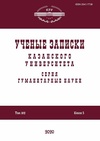Конструирование уголовно-правовых запретов как направление уголовно-правовой политики в первые годы советской власти
Drafting Criminal Prohibitions as a Direction of the Criminal Policy of the Soviet State during Its Early Years
Author(s): A. V. Skorobogatov, Nikolay Nikolaevich RybushkinSubject(s): Criminal Law, Criminology, Pre-WW I & WW I (1900 -1919), Interwar Period (1920 - 1939)
Published by: Казанский (Приволжский) федеральный университет
Keywords: criminal prohibition; criminal policy; criminal law; social construction; legal regulation; civil war; military communism; Soviet Criminal Code;
Summary/Abstract: In this article, we report the results of a comprehensive study of how criminal prohibitions were drafted in the early period of the Soviet rule and what outcomes they are associated with in the Soviet criminal policy of late 1917–1919. To analyze the constructivist paradigm of social phenomenology of law, various methods were used: formal dogmatic, historical and legal, discursive, hermeneutic. A careful investigation of the related normative acts and major doctrinal writings by the most prominent scholars and politicians was carried out. The results obtained prove that the prohibitions enforced by the Soviet state were aimed to develop a new system of criminal justice, thereby upholding law, order, and security. Of special importance is the finding that the principles of criminal law were elaborated in an inductive way despite the attempts to systematize, structure, and revive the past system of criminal legislation. Another interesting conclusion is that the lawmakers of that time were focused on creating a separate corpus of the elements of crime. By having done so, they established the norms of the Special Part of the Criminal Law and contributed a valuable material for subsequent synthesis and compilation of the General Part of Criminal Law. Our research is of particular relevance for both historical and legal studies of the formation of the Soviet criminal policy. It also specifies the use of the constructivist paradigm to explore the history and features of criminal law.
Journal: Ученые записки Казанского университета. Серия Гуманитарные науки
- Issue Year: 164/2022
- Issue No: 4
- Page Range: 134-154
- Page Count: 21
- Language: Russian

